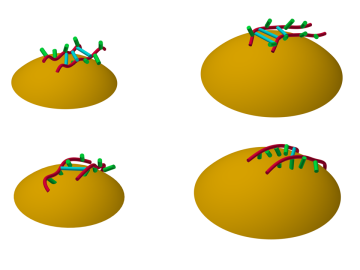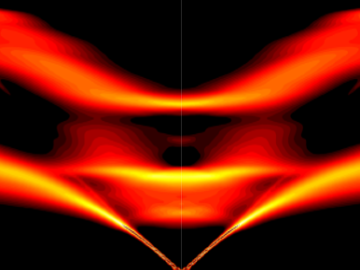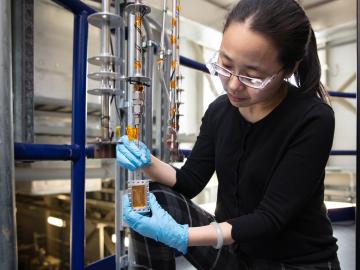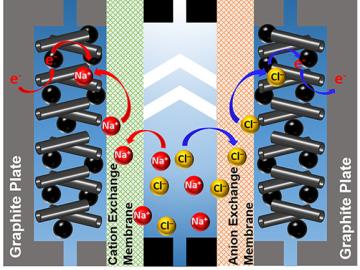
Filter News
Area of Research
- Advanced Manufacturing (2)
- Biological Systems (1)
- Biology and Environment (37)
- Computational Biology (2)
- Computational Engineering (2)
- Computer Science (3)
- Electricity and Smart Grid (1)
- Energy Science (105)
- Energy Sciences (1)
- Functional Materials for Energy (2)
- Fusion and Fission (8)
- Isotope Development and Production (1)
- Isotopes (29)
- Materials (105)
- Materials for Computing (12)
- Mathematics (1)
- National Security (31)
- Neutron Science (35)
- Nuclear Science and Technology (11)
- Quantum information Science (2)
- Sensors and Controls (1)
- Supercomputing (48)
News Topics
- (-) Biomedical (73)
- (-) Clean Water (33)
- (-) Critical Materials (29)
- (-) Cybersecurity (35)
- (-) Energy Storage (114)
- (-) Isotopes (62)
- (-) Physics (69)
- (-) Polymers (35)
- (-) Security (31)
- (-) Space Exploration (26)
- 3-D Printing/Advanced Manufacturing (146)
- Advanced Reactors (40)
- Artificial Intelligence (131)
- Big Data (79)
- Bioenergy (112)
- Biology (128)
- Biotechnology (39)
- Buildings (74)
- Chemical Sciences (86)
- Composites (35)
- Computer Science (226)
- Coronavirus (48)
- Education (5)
- Element Discovery (1)
- Emergency (4)
- Environment (218)
- Exascale Computing (67)
- Fossil Energy (8)
- Frontier (64)
- Fusion (66)
- Grid (74)
- High-Performance Computing (130)
- Hydropower (12)
- Irradiation (3)
- ITER (9)
- Machine Learning (68)
- Materials (157)
- Materials Science (158)
- Mathematics (12)
- Mercury (12)
- Microelectronics (4)
- Microscopy (56)
- Molten Salt (10)
- Nanotechnology (64)
- National Security (86)
- Neutron Science (171)
- Nuclear Energy (122)
- Partnerships (68)
- Quantum Computing (53)
- Quantum Science (93)
- Simulation (65)
- Software (1)
- Statistics (4)
- Summit (71)
- Transportation (103)
Media Contacts

A new method developed at Oak Ridge National Laboratory improves the energy efficiency of a desalination process known as solar-thermal evaporation.

Scientists at Oak Ridge National Laboratory studying quantum communications have discovered a more practical way to share secret messages among three parties, which could ultimately lead to better cybersecurity for the electric grid

A team of researchers at Oak Ridge National Laboratory have demonstrated that designed synthetic polymers can serve as a high-performance binding material for next-generation lithium-ion batteries.

Scientists have discovered a way to alter heat transport in thermoelectric materials, a finding that may ultimately improve energy efficiency as the materials

An ORNL-led team's observation of certain crystalline ice phases challenges accepted theories about super-cooled water and non-crystalline ice. Their findings, reported in the journal Nature, will also lead to better understanding of ice and its various phases found on other planets, moons and elsewhere in space.

Researchers at the Department of Energy’s Oak Ridge National Laboratory, Pacific Northwest National Laboratory and Washington State University teamed up to investigate the complex dynamics of low-water liquids that challenge nuclear waste processing at federal cleanup sites.

Ionic conduction involves the movement of ions from one location to another inside a material. The ions travel through point defects, which are irregularities in the otherwise consistent arrangement of atoms known as the crystal lattice. This sometimes sluggish process can limit the performance and efficiency of fuel cells, batteries, and other energy storage technologies.

A team of scientists led by Oak Ridge National Laboratory used carbon nanotubes to improve a desalination process that attracts and removes ionic compounds such as salt from water using charged electrodes.

Using artificial neural networks designed to emulate the inner workings of the human brain, deep-learning algorithms deftly peruse and analyze large quantities of data. Applying this technique to science problems can help unearth historically elusive solutions.

OAK RIDGE, Tenn., March 20, 2019—Direct observations of the structure and catalytic mechanism of a prototypical kinase enzyme—protein kinase A or PKA—will provide researchers and drug developers with significantly enhanced abilities to understand and treat fatal diseases and neurological disorders such as cancer, diabetes, and cystic fibrosis.


